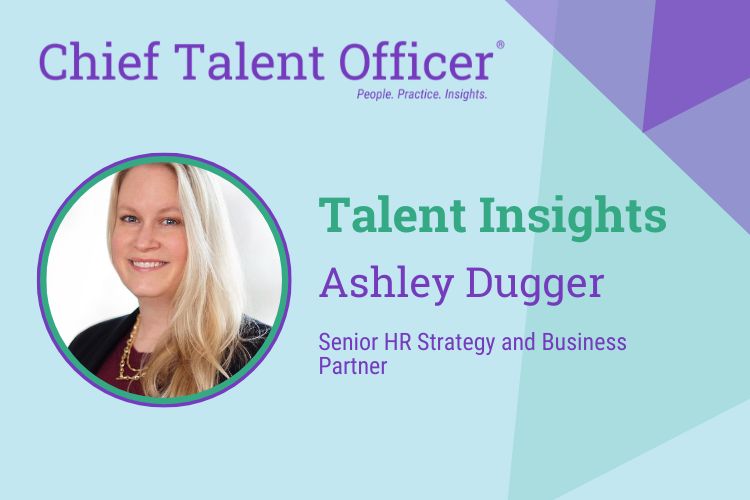Chief Talent Officer’s “Talent Insights” series is dedicated to sharing the insights and expertise of influential talent executives. In this Q&A series, we garner strategic insights, innovative approaches and challenges overcome from C-suite talent and HR executives, chief talent officers, chief people officers and more who are shaping the future of talent management.
What initially drew you to a career in talent management, and how have your experiences in the field evolved over the years?
In all of my operational leadership roles, I always had a hand in learning, development, talent acquisition, retention and employee engagement. Over time, I realized I felt pulled toward these fields as an HR practitioner, with a desire to align strategic goals with how we invest in and treat our employees and colleagues. I wanted to help shape a unique, positive and fun organizational culture day-by-day. Since transitioning into operational HR back in 2016, I also spent some time on the academic HR side and leading a team of HR faculty and program managers, but realized I missed the day-to-day impact of talent management and strategy work, so I recently transitioned back to operational HR as a senior HR strategy and business partner. In this role, I get to merge my love of problem solving and strategic planning with my passion for the people experience and overall talent management.
What core values and principles do you believe are essential for building a positive and inclusive company culture?
Authenticity, transparency, empathy, strategic mindset, inclusion, humor and levity, agility and resilience.
Can you share a significant challenge you’ve faced as a talent leader and how you successfully navigated through it?
Building trust with a team in a remote environment, especially after repeated yearly reorganization/restructures/downsizing. I started with bringing something genuine about myself as a person first, employee second, into my interactions with my team – for me, that was humor and levity. As we became more comfortable as a team, using humor to build connections, develop trust, and strengthen our relationships, we noticed that our ability to bounce back and adapt during challenging times also improved.
“I cringe a bit when I hear ‘customers first.’ Because ultimately, it should be employees first. If your workforce is engaged, motivated and happy, this trickle down effect to your customers and clients is always felt.”
What strategies have you found most effective in attracting and retaining top talent in competitive industries?
Focus on the whole person – not just what they do at work. This means a well-rounded talent acquisition, development and retention plan including total rewards, but also career development, personal growth and ultimately – connection. Salaries and benefits are important, of course, but how someone feels at work, how they are treated and the connections they build with their colleagues can often be what keeps them with an organization or encourages them to grow within an organization versus moving to a different company just for “higher compensation.”
How do you balance advocating for employees’ needs while aligning with your company’s business objectives?
I cringe a bit when I hear “customers first.” Because ultimately, it should be employees first. If your workforce is engaged, motivated and happy, this trickle down effect to your customers and clients is always felt. Without a thriving workforce and a healthy organizational culture, your business objectives cannot ultimately be met. They may get met for a while, but if your culture is toxic or unhealthy and drives folks to burnout, disengagement, or just constant high stress, it is not sustainable.
What leadership skills do you prioritize and cultivate as a senior talent leader to inspire your team and drive talent initiatives?
Servant leadership. I will never ask my team to tackle something I myself am not willing to also handle or help with. Not to say we don’t delegate, but there is no task beneath anyone, and if you feel your title or your salary or your relationships at work preclude you from the difficult work, leadership probably is not for you. I also prioritize leading where I am, and encourage others to do the same. Leadership is not just about formal titles, hierarchy or positional authority. Most leadership happens in unofficial and informal relationships and situations, where others find influence without power dynamics, but because they genuinely feel led to follow or emulate behaviors they admire and respect, regardless of formal authority. I also believe in leading with authenticity. If you wear a “mask” of leadership without genuinely connecting with and believing in your team, your priorities, or espousing your cultural values on a daily basis, your team will easily pick up on this. It is crucial that your words align with your actions.
What game-changing advice would you offer if you could go back in time and mentor your younger self?
Don’t feel pressured to take the next step “up” the ladder. It’s OK to step sideways and step backwards, as long as you are still moving! Also, I would tell myself that toxic culture is not part of every work situation, and that it is OK to stand up for yourself when you are being mistreated or in an unhealthy work environment. If you do your best to help shift the culture to a positive one, it is OK to eventually remove yourself from the situation if it doesn’t change. It is not “just how it is.”
What do you feel is currently the single biggest challenge facing talent professionals and the industry as a whole?
Burnout! We are pulled in so many competing directions, and the excitement for our profession can easily cause scope creep, whether intentionally or unintentionally, and if we try to be everywhere, do everything and tackle all our priorities at once, we will only keep spinning our wheels.
We’re always looking to showcase innovative tools and technologies. Can you share one tech product or platform that has significantly improved your work processes and why you find it valuable?
Definitely not a new platform, but it has been eye-opening to me how many talent management professionals are not fully utilizing LinkedIn. Not only for networking, but for getting their voice and incredible industry insights shared with others through collaborative articles, thought leadership work, engaging discussions on posts and comment threads, sharing research, etc. Often, I speak with folks who don’t even know this is all available on LinkedIn; they think it is still just to share a resume!
Interested in being featured in our “Talent Insights” series? Please complete this FORM.
















